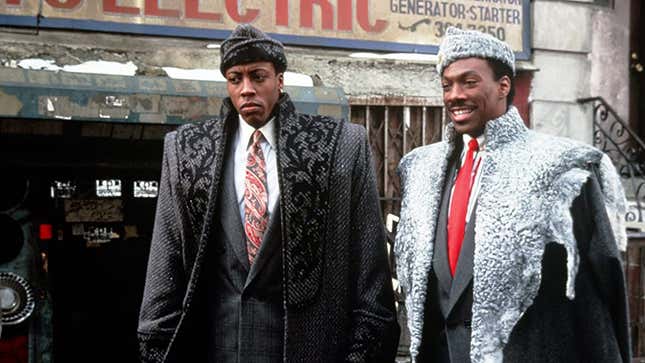
Did Wakanda have housing projects? Payday lenders? A Wakandan Dollar General?
These are questions I have whenever I watch Black Panther, and I’m sure there are comic book people who can provide answers. They are also dumb questions because Wakanda doesn’t exist, and whoever invented that nation could also invent a world where royalty can exist without intentional financial inequity. Each resident of Wakanda, if the creator’s whims demand it, could have the sort of money where they use “summer” as both a noun and a verb in the same sentence. (“Where did you summer last summer, M’baku?”)
It’s not hard to grasp why the sort of utopian kingdom depicted in Black Panther—and also in Coming to America, Michael Jackson’s “Remember The Time” video, and Beyonce’s Black Is King—is so captivating to so many Black Americans. We are, mostly, descendants of the millions captured from Africa, shipped across the Atlantic to the Americas—a journey that killed as many as two million people—and enslaved for generations. If the year 1619 represents the true genesis of our nation, we (Black Americans) were slaves longer than we’ve been anything else here, and that reality is a mindfuck. But America is not where we began. There were vast civilizations in Africa. Some of which were kingdoms, and forging and savoring a connection to that linage is a spiritual and psychological correction to a slavery-dominated history. “Don’t forget little nigga,” an aggressively mediocre barber told me, 30 years ago, after etching a crooked part into my blend, “you have king’s blood in you.”
Unfortunately, this sort of re-remembering neglects a few unbendable tenets of the existence of royalty. Mostly that royalty dictates that only a select few people could be it. If you’re from a kingdom with a million residents, you don’t have a million kings. Just one king, just one queen, a handful of random royal niggas and like 15,000 goat herders. Also, there are no kings who are also just, because the existence of birthright negates justice. Some people who happen to be kings and queens might be better people than others, but their position is inherently bad. They’re impervious to laws and rules—both of which they could change whenever they felt like it—and wealth is both consolidated by and streamed directly to them. Whether they choose to distribute it depends on their level of magnanimity.
But this is not new information! It might actually be the oldest information! If any of this is new to you, please stop reading this and go read an almanac or something! I’m less concerned about the function of kings and queens than the implicit sentiment beneath the compulsion to be linked to them, which is that an ancestor who might have been a king is better than an ancestor who definitely was a slave. As if it’s somehow shameful to descend from people who survived the middle passage and somehow managed—through centuries of murder, of rape, of torture, of pillage, of kidnap, of state violence, of families split, of laws barring them to read and to love—to produce you and your goofy-ass “I’m not my ancestors” t-shirts. If your ancestors somehow made it through the greatest evil of the millennium, you should be proud of that, you fucking lame.
But if we must trace back to Africa, I’d rather come from a long history of proud goat herders than royalty. Although I’ve never herded a goat, I assume that’s an honest and honorable living. Also, I’m assuming my great-great-great-great-great-great-great-great-great-great-great-great-great-great-great-great grandparents would be proud that their grandkid makes a living blogging about steaks. But if they were kings, they’d probably be furious I didn’t own enough slaves. “A DESCENDANT OF MINE OWNS ZERO SLAVES?!?!” they’d fume in their tombs, and I don’t need that sort of pressure!

